Twilight's Last Gleaming (1977)
Directed by: Robert Aldrich
Written by: Edward Huebsch, Ronald M. Cohen, Walter Wager
Starring: Burt Lancaster, Charles Durning, Melvyn Douglas, Paul Winfield, Richard Widmark
USA/West Germany
AVAILABLE ON DUAL FORMAT BLU-RAY AND DVD: 24TH OCTOBER, from EUREKA ENTERTAINMENT
RUNNING TIME: 146 min
REVIEWED BY: Dr Lenera, Official HCF Critic
After escaping from a military prison, rogue Air Force General Lawrence Dell and accomplices Willis Powell, Augie Garvas, and Hoxey infiltrate a Montana ICBM complex that Dell helped design and gain launch control over its nine Titan nuclear missiles. Hoxey guns down an Air Force guard for trying to answer a ringing phone and is shot dead by Dell. The three then make direct contact with the US government, avoiding any media attention, and demand a $10 million ransom, and that the President go on national TV and make public the contents of a top-secret document….
This political thriller, whose title is taken from a line in the US national anthem The Star-Spangled Banner, seems to be largely unknown [I recognised the title but didn’t know anything about the actual film], and upon watching it I couldn’t understand why as it genuinely gave me goose bumps, me being someone who is old enough to actually remember a time when we seemed to be just a few minutes away from a nuclear launch. It’s perhaps a little overlong in its full version, but some of its lengthy dialogue scenes are as riveting as the passage of suspense and action and really make you think about issues which are probably as timely today as ever. It does contain some political messaging – how could it not do with well known liberals Robert Aldrich [director] and Burt Lancaster [star] being involved – but it’s also quite well balanced and rabid right wingers could probably take something away from it too, though at its heart it’s about the lengths an establishment will take to protect itself, and a plea for more open government. Here and there are some examples of awkward editing from scene to scene as if a still longer version exists, and not all the extensive split screen footage works, but overall it’s well handled by Aldrich in what was his last film of real note and is mostly [there’s the odd exception] strongly acted by a terrific cast.
By 1976 Aldrich, whose fortunes were constantly changing, was once again considered a bankable director after the hit that was The Longest Yard, and was offered a huge salary to make A Bridge To Far, but preferred to go to Germany to make Twilight’s First Gleaming. The script by Ronald M. Cohen and Edward Huebsch was based on a 1971 novel Viper Three by Walter Wager, but it added the element of the Vietnam war which is so important in the film. Lancaster initially turned the script down when he was first approached about the project, but eventually agreed to do it after Aldrich, with whom he’d worked with three times before, became attached. Paul Newman was offered the role of the President of the United States, but turned it down. Shot at Bavaria studios and Munich, it was completed ten days ahead of schedule. Aldrich cut Vera Miles’ role as the First Lady from the final release print,but the nearly two hour and a half film was cut to two hours for export release after it bombed in the US, removing some of the Vietnam-related material, while an even shorter version called Nuclear Countdown appeared on video and on TV in some countries which diminished the politics so much that it made little sense. I would imagine that the film would have looked terrible on full screen video due to the large amount of split screen used.
Hearing Billy Preston sing the song My Country, ‘Tis of Thee initially seems like an odd way to open the picture until you listen to the lyrics which are very ironic. Now I said that there is some awkward editing in this film and it’s mostly in the opening act where we follow Dell and his three helpers as they get into the ICBM complex, but with what seem like short portions of other scenes involving other characters slightly haphazardly cut in. Never mind, we soon get to some bed-wettingly tense material as Dell, Powell, Garvas, and Hoxey have to get rid of the booby traps which could kill them and will otherwise stop them being able to launch any of the nine missiles which are now in their possession. It’s much like your typical bomb disarming scene and I never tire of scenes like this so it was most welcome. Hoxey is soon out of the picture because he’s shot dead by Dell for being too quick on the trigger, then Dell demands to be connected with the President and issues his demands. When President David T. Stevens initially just offers to send the money, Powell and Garvas, who were basically in it for the money anyway, tell Dell that they’d be satisfied with that, but Dell wants Stevens delivered to him so he can go on TV and tell the American public about a document telling of a secret policy, a policy which contains conclusive proof that the US government knew there was no realistic hope of winning the Vietnam War but continued fighting it for the sole purpose of demonstrating to the Soviet Union their unwavering commitment to defeating communism.
This, of course, is based on both the 1957 book Nuclear Weapons and Foreign Policy by Henry Kissinger, in which the future Secretary of State outlined a strategy committing the US to promoting regional conflicts to deter the Soviets from initiating full-scale war, and the more recent release of the Pentagon Papers which revealed certain facts about the Vietman war which did not put the US government in a good light, such as it not being about securing an “independent, non-Communist South Vietnam”, as Lyndon Johnson insisted, but, according to a memorandum by Secretary of Defense Secretary Robert McNamara, “ to contain China”. Steven’s moral outrage at all this comes across a little naïve by today’s standards but it’s still very pertinent stuff what with the Chilcot Enquiry and other things in recent news, while the film – and this is something which rather surprised me – isn’t entirely one sided, with its so-called ‘villains’ of all sorts being given a point of view that we can understand even if we don’t agree with. Even after he’s shot people, Dell, who it turns out has been appallingly treated, initially seems to be a character to back – after all, he’s in the right [unless you’re one of those few people who still believe the Vietnam war was justified] – until he comes extremely close to actually launching the missiles [excellent miniature work here which I didn’t realise actually was miniature work until I watched the documentary on the Blu-ray] about half way through the film. Amidst all this, some humour does sneak in, like when Powell suggests to Dell the possibility of a midget sniper being used by their attackers. “There are no midgets in the US Air Force” replies Dell with total seriousness.
This cannot at all be considered a straight action movie, but the efforts of Gen. Martin MacKenzie to thwart Dell’s plan do provide some thrills, while a scarily ominous feel hangs over the whole film despite much of the time being given to lengthy scenes of chat, your enjoyment of which may depend on how interested in all the political issues you are. The finale doesn’t provide the hair raising finish that we would expect from a story of this kind, and which would almost certainly take place if the film was made today, but it does provide a genuine shock which certainly surprised me even considering it’s in a film from the ultra-cynical Aldrich. For this film, he obviously decided to use the split screen technique in as many ways as he could, from showing events occurring simultaneously in totally different locations, so showing the same event from different points of view, to even showing a scene at the same time as showing it using the same angle from the point of view of a security camera. Sometimes it does work, but more often than not it becomes a distraction, evidence that this technique is best use in small doses, something even Brian De Palma realised.
In a cast full of Hollywood veterans [even Joseph Cotton shows up], Lancaster is first class as usual, his effortless style of acting becoming a more coldly intense performance as the film goes on, and Charles Durning is a good President who doesn’t at all seem to be based on anybody. An almost out of control Burt Young lets the side down a little though; he’s just silly and in the wrong movie. Jerry Goldsmith contributes a fairly sparse score which appropriately seems to flirt with the patriotic militarism of his scores for Patton and MacArthur but never gets there. A tad unwieldy in places, and perhaps more enjoyable than maybe was intended, Twilight’s Last Gleaming is still a film of some importance and deserves to be far more widely known and seen than it is. One really wishes that Aldrich, Lancaster and the screenwriters were still around today to see how right they were. And it seems more ambiguous the more you think about it. Its final scene hinges on a promise which we hope will be kept, but it’s up to you to decide whether it will or not. I certainly don’t think it will be, but then I’m an old cynic just like Aldrich.
Rating: 









Eureka’s Blu-ray of Twilight’s Last Gleaming has a very sharp picture, excellent colours, and overall looks very impressive. I didn’t notice any significant flaws at all. Like the Region ‘A’ release from Olive Films, the main special feature is a making of documentary, but the 70 minute effort produced in Germany is very good indeed, with input from Aldrich’s daughter Adell, actor Gerald S. O’Laughlin and Aldrich biographer Alain Silver, and with lots of information about the movie. A warning comes at the start of it saying that there is some minor ghosting prevalent, but it’s so minor that the warning wasn’t really necessary.
SPECIAL FEATURES:
*High-definition digital restoration
*Uncompressed PCM audio on the Blu-ray
*English subtitles for the deaf and hearing-impaired
*“Aldrich Over Munich – The Making of Twilight’s Last Gleaming” documentary
*PLUS: A booklet featuring new writing and archival images

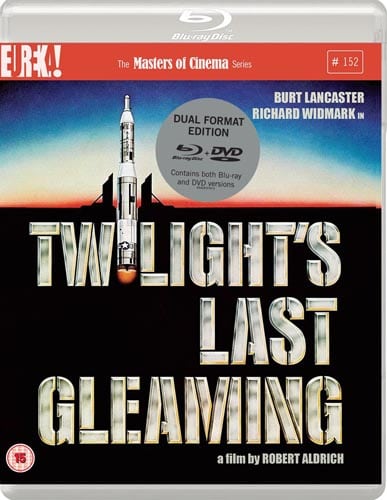
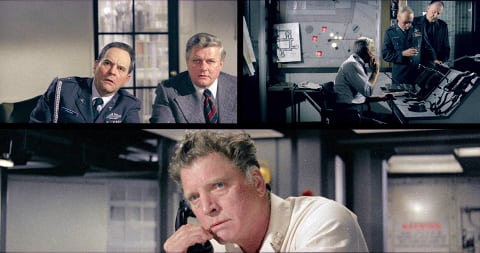


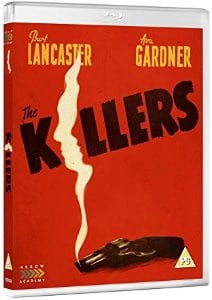
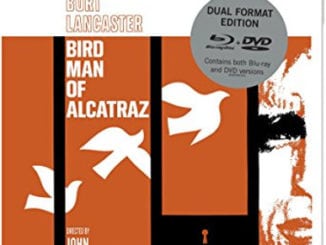
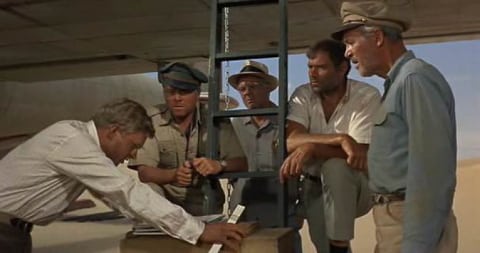
Be the first to comment